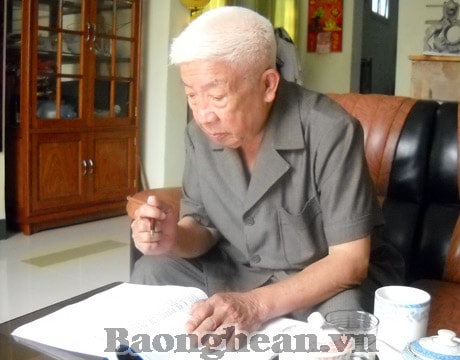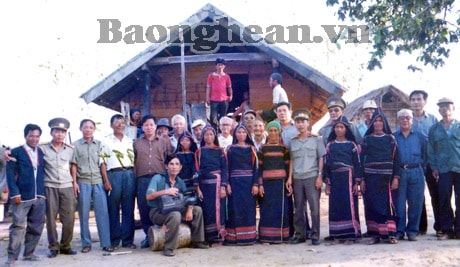Poet Van Cong: Living and writing faithfully with the revolution
(Baonghean) - Tho Lo with names like Ma Quan chief, village chiefs, village elders Ma Kham, Ma Gam, Ma Kheo, Ma Kho, Ma Ngoe, those who led the village to fight the enemy... in Van Cong's literary pages are truly heroic! And the Party Secretary Ma Pop (Van Cong), who had many contributions to building the revolutionary movement here, was considered by the people as a special chief...
(Baonghean) - Tho Lo with names like Ma Quan chief, village chiefs, village elders Ma Kham, Ma Gam, Ma Kheo, Ma Kho, Ma Ngoe, those who led the village to fight the enemy... in Van Cong's literary pages are truly heroic! And the Party Secretary Ma Pop (Van Cong), who had many contributions to building the revolutionary movement here, was considered by the people as a special chief...
In 1988, the first time I went to Nha Trang, I was led by Dr. Nguyen Dinh Tho, Chairman of the Khanh Hoa Province Bar Association, to visit poet Van Cong, whom he called his grandfather. Different from my image of a former Deputy Secretary of the Phu Yen Provincial Party Committee and former Acting Chairman of Phu Khanh Province, Van Cong was short and sloppy, looking more like an old farmer than a politician. Still with his pure Nghe accent, he told me: “Do you think this house is beautiful? It’s the State’s! When the province is divided, I will return the house and go back to Phu Yen. I just want to go to the West, it’s very affectionate!”
True to his word, in mid-1989, the province was divided, he returned his house, said goodbye to the splendid Nha Trang to return to Phu Yen, which was still full of difficulties. Although he did not return to the West, living in Tuy Hoa, he had more opportunities to regularly visit Tho Lo, the West, the place that was closely associated with his life through two resistance wars.

Poet Van Cong.
Poet Van Cong's real name is Cao Xuan Thiem, born in 1926 in Dien An commune, Dien Chau district (Nghe An province), in a family of scholars, a famous family for its mandarins and many great intellectuals. In 1946, eagerly joining the Southern Advance army, he arrived in Phu Yen and as if by fate, he tied his life to the Western region of Phu Yen, with names like Ma Pop, Ma Xi, Ma Xoong, also wearing a loincloth, having long hair, walking barefoot, speaking the ethnic minority language, living and fighting with the people in the most difficult and arduous conditions of the resistance war.
A hungry West with bland rice and salty but full of Kinh-Thuong brotherhood, a heroic and indomitable West passing through Van Cong's life became poems that were blazing with fire, full of love for life, pages of literature full of deep feelings for the great forest, shimmering with legendary colors, and full of fighting events. More than 20 books, of which 15 were printed separately with names such as Land of Love, Legendary Land, Land of Fire, Memories of a Land,... are his heart for this land full of gratitude.
In fact, after nearly 10 years of attachment to the West, to Phu Yen, at the end of 1954, he was supposed to return to his homeland on a train to the North. However, after his achievement of returning to Phu Yen to bring comrade Le Dai, Deputy Secretary of the Provincial Party Committee, who was temporarily hiding in the ethnic minority area to Dieu Tri, Binh Dinh to attend a meeting chaired by comrade Vo Chi Cong (representative of the Zone 5 Party Committee), the Phu Yen Provincial Party Committee decided to keep him as a liaison officer in charge of the secret line from Phu Yen to the Zone 5 line hub and the provinces of Binh Dinh, Dak Lak, and Gia Lai. He said, looking at the last train carrying the assembled cadres to the North, he could not help but feel sad, especially since the train carried a letter he sent to the girl he planned to marry this time in the North.
There is a name that comes back again and again, the focus of Van Cong's works, that is Tho Lo (Phu Mo commune, Dong Xuan district). As he wrote, it is the land of "a branch tribe of the Ba Na people", who have long "lived like wild people, without any control from anyone, whether the feudal king or the French colonialists". However, that tribe of less than 1,000 people became the first spark of armed struggle, the place where the revolution stood in the most difficult days, the steadfast land that the enemy could not shake and also the first liberated zone of Phu Yen province in 1957.
Tho Lo with names like Ma Quan chief, village chiefs, village elders Ma Kham, Ma Gam, Ma Kheo, Ma Kho, Ma Ngoe,... who led the village to fight the enemy, in Van Cong's literary pages were very heroic. And the Party Secretary Ma Pop (Van Cong), who had many contributions to building the revolutionary movement here, was considered by the people as a special chief. As for Ma Ngoe, he considered her as the hero of Western Phu Yen, the one who saved him. He told me: "If it weren't for H' Ngoe, Ma Ngoe's daughter, who listened to her father and pretended to be my wife, the enemy would have shot me a long time ago." Y Ngoe died very young after giving birth during an enemy sweep. Ma Ngoe also died a long time ago, but until now has not been awarded the title of hero. “You left the apricot forest, the banana tree/ Left your old mother on the moonlit stream/ I stopped by to add more soil/ To strengthen your grave and our love…” He wrote some very touching poems and prose about them, but why does his heart still feel restless?
Van Cong was one of the first poets of the Southern Liberation literature. His two poems, “Long Em” and “Tieng Ba Em” (1960), won the first prize in the Thong Nhat Newspaper’s poetry contest. The collection Tuyen Dau To Quoc and the collection Tieng Sing Mien Nam (published together) were awarded the Nguyen Dinh Chieu Prize. His poem “Nguoi Cong San” (1958) was translated by a major newspaper in France and published during the days of the anti-American war. Reading Van Cong’s poetry and prose, one can imagine his entire revolutionary journey. The strange thing is that he was still able to write in the most difficult and harsh conditions. He said that many nights, alone, in a hammock in the middle of the jungle, he composed poems, reciting them over and over again until he knew them by heart, and then later he had pen and paper to write them down.

Van Cong (second from right, first row) on his visit back to the West.
After the complete liberation of the South, no matter what position he held (District Party Committee Secretary, Vice Chairman, then Acting Chairman of the Provincial People's Committee), or whether he had retired, whenever he had the chance, he returned to the West, to the Tho Lo base area. He said: I returned to visit the mountains and forests, to visit my compatriots, to look into them to keep my heart strong, to live worthy of the people and the Party. And also, to recharge my pen. It is not difficult to explain why he was able to write so much after retirement. Every two or three years he published a book, each one thick and heavy.
A hard life, with little rice and salt, and the Nghe people's character, created a brave, strong, and very simple Van Cong. When he was a provincial leader, every time he went on a business trip to the localities, he often took rice with him. Journalist Phan Thanh Binh of Phu Yen Newspaper, former secretary of Van Cong when he was Acting Chairman of Phu Khanh Province, said: One time he went to a locality in the province to convey the Resolution on prices, wages, and money. After conveying, the local leaders kept exclaiming: "Until now, we have been in the dark, fortunately thanks to Mr. Sau, we have become enlightened." He did not say anything until he got in the car, took out his rice to eat, then he told his colleagues in the group: "Actually, I see that this resolution is still in a mess in its implementation. But they said it was enlightened, but I don't know where it is!?" Throughout the trip, he did not talk about the resolution anymore, but only talked about poetry and literature.
Talking about the beautiful house in Nha Trang that he returned to the State, he said that when he returned to Phu Yen, a leader suggested giving him back the house worth billions of dong at that time, but he thanked him and refused.
He had a deep love for his homeland, Nghe An, wrote many poems about his homeland and always considered us, the children far from home, as his children and grandchildren. In Son Nguyen commune, Son Hoa district, there was a prosperous village where all the Dien Chau people came to settle down. After liberation, he returned to his hometown and saw that the land was cramped and the population was large. At that time, he was the Secretary of the Tay Son District Party Committee (currently Son Hoa and Song Hinh districts), he mobilized people to reclaim land and establish a village to make a living. The people considered him an honorary citizen of the village...
As for Tho Lo, when he hasn't been back for a long time, people still remind him. They still call him Ma Pop, Ma Xi, Ma Xoong. Nearly 90 years old, he has been a member of the generation of Vietnamese writers at a "rare" age for a long time, his health is very poor, now even though he can't often return to the West, to Tho Lo, but every day, sitting in front of a page of paper, the West, Tho Lo appears again, full of memories, so that he can have more poems, more meaningful pages of literature for life!
Phan Xuan Luat - (Phu Yen Radio and Television Station)






